8 tips to having a great WWOOFer experience
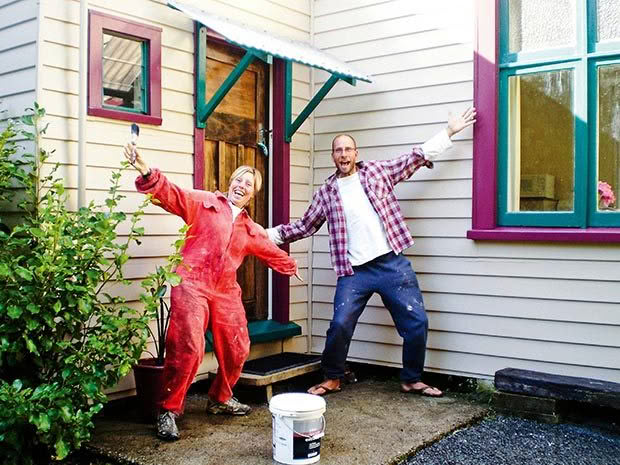
WWOOFers Mick and Shaz painting the house.
WWOOF host Diana Noonan offers some vital tips on how to attract and manage reliable, happy willing workers in a digital age.
Words and Photos: Diana Noonan
A gorgeous, friendly, young lifesaver from California is standing at my kitchen bench swishing detergent back and forth in the sink, as happy as a kid playing in a bubble bath.
“Can I do the dishes tomorrow night, too?” he asks.
Eighteen year old Stephen is one of three WWOOFers staying with us for two weeks and, believe it or not, this is the first time he has ever ‘washed-up’ as he calls it. He’s loaded a dishwasher plenty of times, but this playing around in the sink is something else.
“You can wash up as often as you like!” I tell him.

New experiences by WWOOFers can be as simple as doing dishes for the first time.
A WWOOFing couple in their thirties from the UK who have stayed with us on two previous occasions are doing their best not to smile. Mick and Shaz are practically professionals when it comes to WWOOFing and this summer they’re repainting the outside of our house. Unlike Stephen, who will appreciate instruction and a fair degree of supervision for the first few days he’s with us, they like to be left alone to get on with their task independently.
The total contrast between our two sets of guests is completely normal in the world of WWOOFing, the world-wide organisation dedicated to teaming-up organic-principled gardening/farming hosts with people who want to learn the tricks of the trade. Nowhere is the organisation stronger than in New Zealand where for over 25 years, travellers (mainly in the younger age bracket) have been enjoying WWOOFing as a way of life while they get to see our wonderful country.
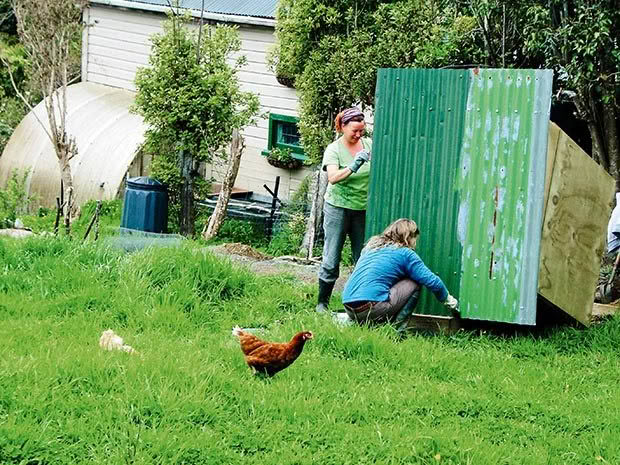
These WWOOFers came all the way from Brighton, UK to paint a chook shed in Papatowai.
But while most people have heard of the scheme, the majority have little idea of just how the programme has changed since its early beginnings, and of how they can still make it work for them.
Enter the internet. The organisation is now internet-based and a far cry from the days when just a handful of WWOOFers were in the country at any one time. This is when complete strangers would turn up at the door, unannounced, barking ‘woof’ – often the only word of English they could speak!
WWOOF now has its own website (www.wwoof.co.nz) and there has been a huge increase in the number of people enjoying overseas travel so there are literally hundreds of WWOOFers in the country at any one time, and dozens of hosts competing for a helping hand.
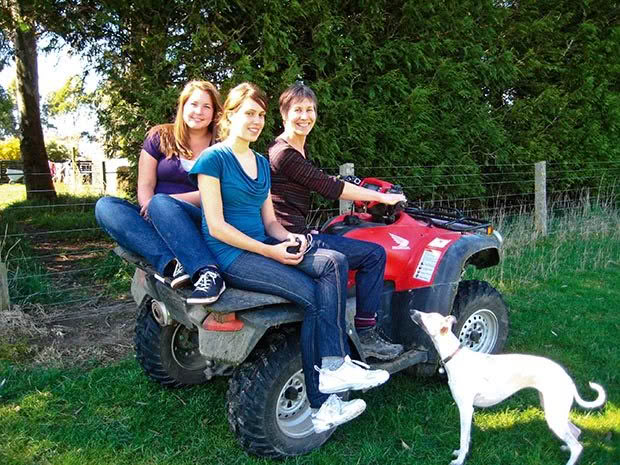
WWOOFers Vera and Eva (left and middle) enjoying a day out on a friends farm.
Thanks to the website, WWOOFers and hosts can now post their resumes and requests online so it’s possible for everyone to get to know each other long before they meet. It rather begs the question of why it can all go so wrong, but as we all know, the internet is not the answer to everything.
When it comes to making a WWOOF experience mutually beneficial to host and WWOOFer, there’s more to it than posting your details on the site.
EARLY BIRDING
The busy spring-early summer period is not the time for hosts to be selecting WWOOFers, yet that’s almost always when new hosts suddenly decide they need help and when there are, quite literally, dozens of WWOOFers emailing you to ask for work. Desperation and despair are likely to pressure you into unwise choices.
Allowing a longish lead-in time to find a WWOOFer means you’ll almost always connect with the person who has the experience, or good old get-up-and-go that you’re looking for. That carpenter or painter you so badly need will be out there somewhere, but you won’t find them overnight.
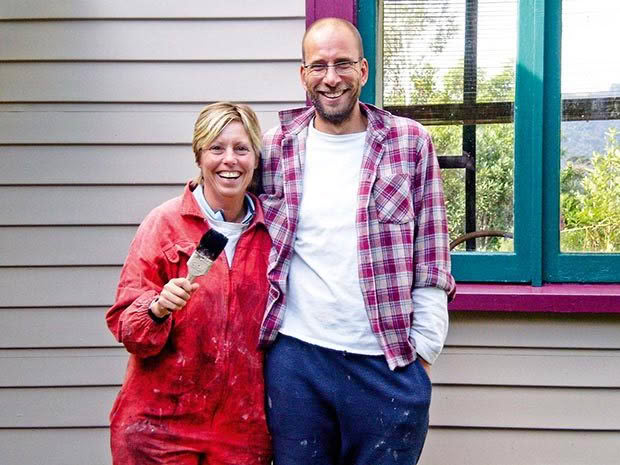
WWOOFers Mick and Shaz.
You need to search on the ‘Hotlist’ section of the WWOOF site well in advance, or post a ‘wanted’ note to make sure you get your pick of WWOOFers. This gives you time to interview them (Skype is great for this) if you want to, and to establish relationships with the ones you choose. All this can often take place long before they even arrive in the country. It also makes sense that WWOOFers who plan for and seek hosts well in advance of their arrival are already displaying the kind of initiative that you’ll be looking for in a worker.
CREDENTIALS COUNT
You wouldn’t engage a paid worker without references, so why would you invite a WWOOFer to your home without knowing something about their employment history? If your potential WWOOFer has worked in the scheme before, check on their profile page for comments from other hosts.
If they’re newbies, don’t feel shy about asking for a work or character reference. If anything, it will only make your would-be WWOOFer feel more secure because they can be certain that you’re an experienced, well-organised host.
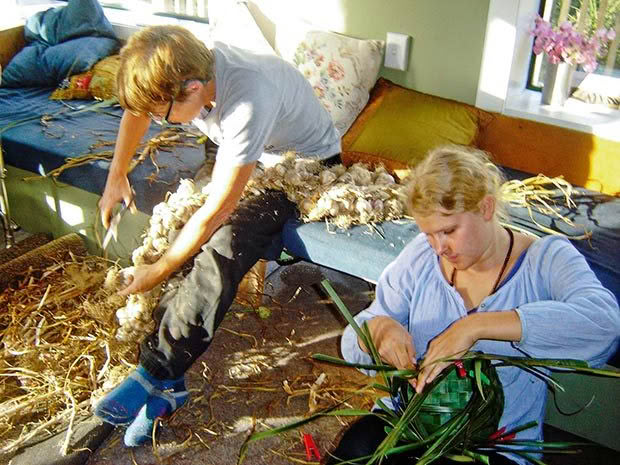
WWOOFers learing new skills
Invite potential WWOOFers to check out comments on your own profile too. This is a very good reason for reminding your working guests to post comments on your site too. That way, a friendly but no-nonsense relationship can be established.
WINNING WAYS WITH WWOOFERS
One of the big difficulties for some hosts is knowing where WWOOFers fit into the scheme of things. After all, they’re not an employee and they’re not your personal slave. According to NZ immigration rules, they’re also not supposed to be doing work which would otherwise be carried out by a paid worker. While this comes as a surprise to many WWOOF hosts, it’s a point worth remembering given that it is not unknown for immigration officers to question WWOOFers about what work they have been doing, and even to temporarily confiscate their travel diaries in search of information.
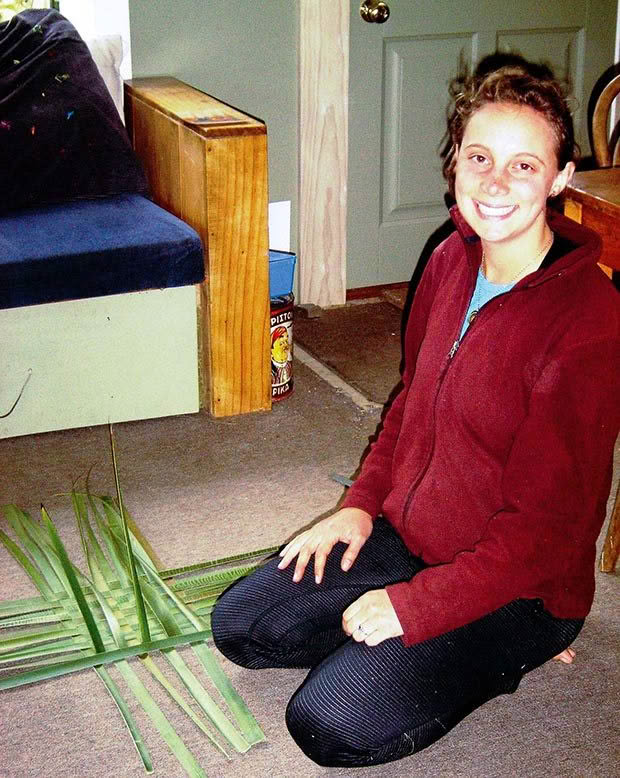
Many WOOFers enjoy the new experiences like learning how to flax weave.
WWOOFers fall into that hard-to-define twilight zone somewhere between guest and volunteer which means your task as a host is to make them feel welcome, to provide comfortable accommodation and meals, but at the same time to make it clear what is expected in return.
Transparency is the answer to getting it right before you and your WWOOFer even get down to work. Sit down with them over a cup of tea and check out a few basics (or if you’ve already done this by email, reconfirm them). What they do and don’t like to eat always goes down well, especially if you enquire as to what their favourite food is and try to provide it once or twice during their stay. I always ask when their birthday is in case it’s while they’re staying with us.
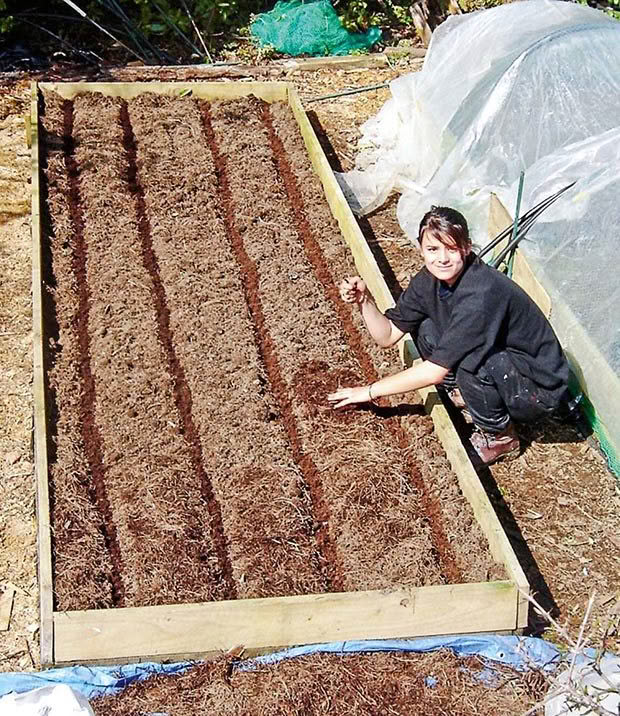
Learning new skills like organic gardening.
Double check that everyone is clear about each other’s expectations regarding work – after all, this is not a one-sided arrangement – and be sure to make it clear that you hope to learn something from them as well as offering to teach some new skills.
OFF-SEASON OPPORTUNITIES
In spring and summer every man and their dog is looking for a WWOOFer or two and, at short notice, it can be difficult to find someone suitable to help out. Winter is a whole different ball game.
Most WWOOFers leave the country at the end of summer but the few who winter-over are often the most experienced and skilled. For them, the scheme is a way of life and with this comes loads of energy and a desire to please, especially in the colder months when longish-term stays are highly valued.

Good food is a drawcard for winter WWOOFers.
After all, who wants to be sleeping in a tent or camper in August! With plenty of help in winter, whether it’s preparing beds, cutting back summer growth, turning compost, or attending to indoor maintenance jobs such as painting, you may find you can manage without WWOOFers during spring.
We go the extra mile for our winter WWOOFers, making delicious hot puds, mulling wine, and finding plenty of time to chat and play music together in the evenings.
THE ESCAPE CLAUSE
While you’re discussing expectations, be sure to double check that your WWOOFer understands clearly the length of stay you are offering. Nothing is worse than hosting someone who is unwilling to pull their weight or to join in the day-to-day routine of the family.
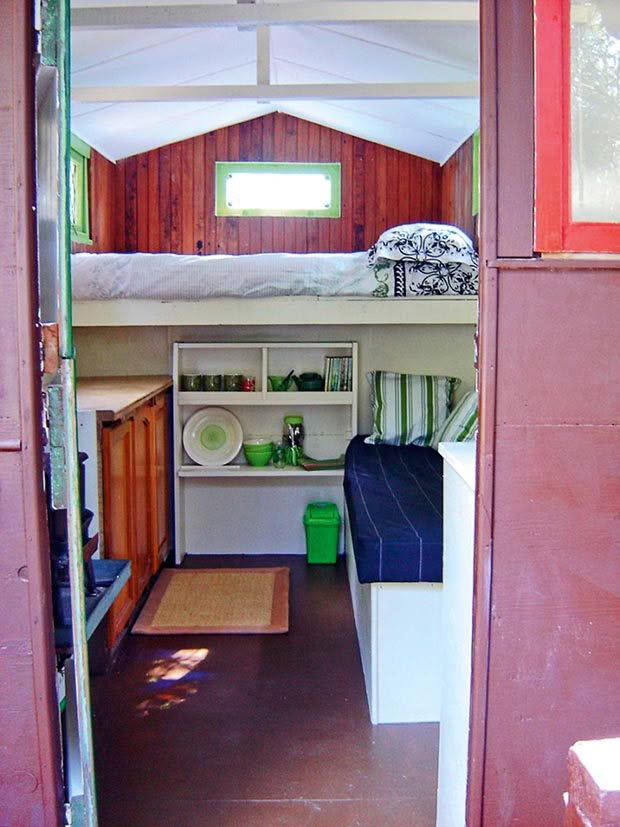
WWOOFer accomodation.
We always offer our WWOOFers a minimum three-night stay regardless of their attitude or capabilities as we live in a remote spot and they’ve expended a lot of time, effort, and often expense to reach us.
They know before they arrive that if both they and we are happy with how the days are panning out, the stay can be extended to something that is mutually acceptable.
SLOW AND STEADY
A lot of WWOOFers, especially younger people who haven’t been involved in the scheme for long, like to leap into their tasks with gusto, only to get so worn out they can barely make it to the end of the week.
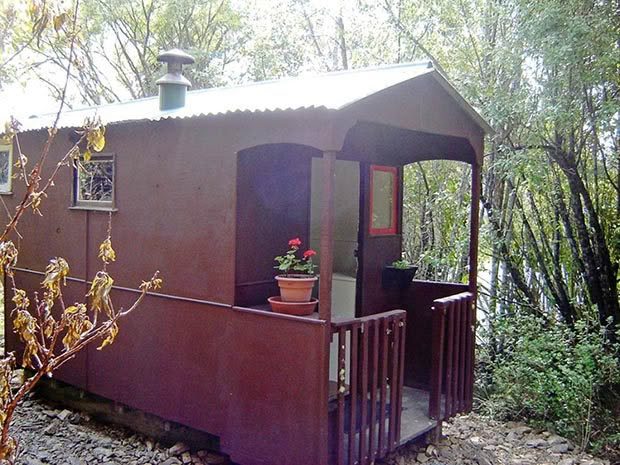
Welcome to your new WWOOFer home.
It is important as a host to draw a halt to work after the agreed number of hours, and to enforce some leisure time, as it is to gently ensure people are completing their chores.
Late nights (resulting in difficulty getting up the next morning) are also a temptation with the younger set, and the best way to discourage this is to limit internet use or simply have a lights-out house rule. It you’re unsure of how to go about maintaining a sensible household routine, imagine your younger WWOOFers are your own teenagers and treat them in a similar fashion with patience, firmness, good humour, encouragement and praise.
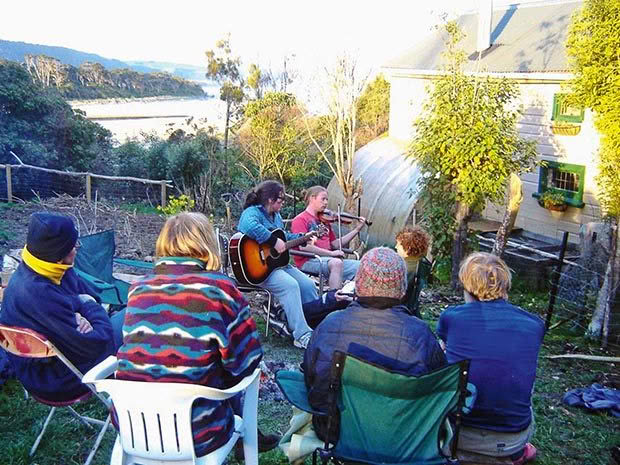
WOOFers providing some evening entertainment.
Don’t go near their accommodation unless you absolutely have to. That way, you won’t have to look at their mess!
COMMUNITIES COUNT
It’s almost a given that your WWOOFers will want to be involved not just in your home and garden or farm, but in the everyday activities of your community. Whatever we’re attending in our neighbourhood, whether it’s a Christmas party, mid-winter feast or school concert, we always invite our WWOOFers along. In essence, they become our family for the time they are with us.
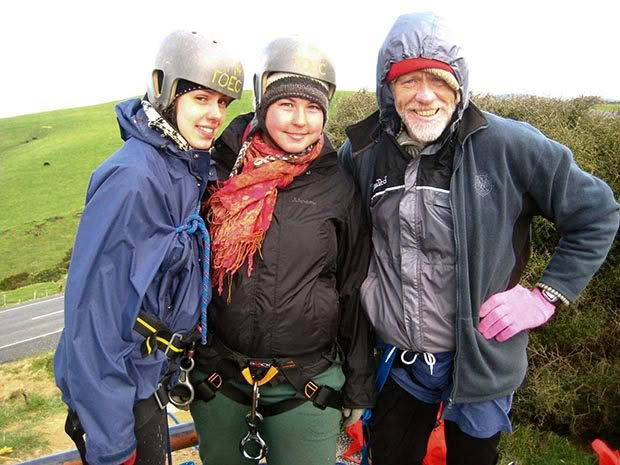
WOOFer host Keith takes Vera and Eva abseiling on their day off.
GETTING IT RIGHT
How do we know we’re getting the relationship between WWOOFer and host right? The comments left on our WWOOF site are a clear indication, but more so are the wonderful letters we receive from ex-WWOOFers, often years after they first stayed with us as teenagers fresh out of school on their gap year adventure.
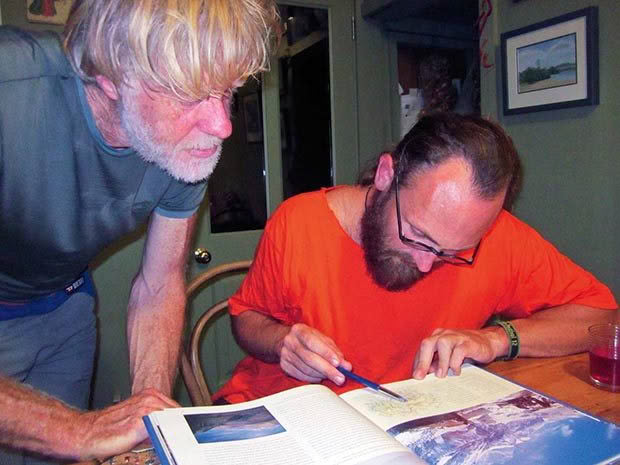
WWOOFer Ollie gives Keith tips on walks to do in Nepal.
With maturity and hindsight, they look back and realise that the best part about WWOOFing at Papatowai was that in a far-off foreign country, they were for a time as much a part of a community as a local, and as much a part of a family as a son or daughter.
If we can maintain that feeling while receiving a much-needed hand with our home and garden, we’ll keep on WWOOFing!
Love this story? Subscribe now!
 This article first appeared in NZ Lifestyle Block Magazine.
This article first appeared in NZ Lifestyle Block Magazine.
